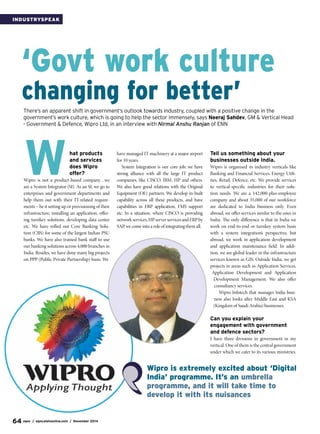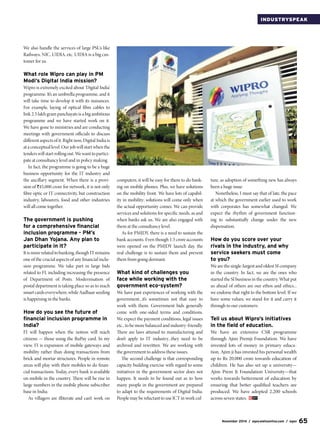64-65 Neeraj Sahdev
- 1. 64 egov / egov.eletsonline.com / November 2014 IndustrySpeak W ‘Govt work culture changing for better’ There’s an apparent shift in government’s outlook towards industry, coupled with a positive change in the government’s work culture, which is going to help the sector immensely, says Neeraj Sahdev, GM & Vertical Head - Government & Defence, Wipro Ltd, in an interview with Nirmal Anshu Ranjan of ENN hat products and services does Wipro offer? Wipro is not a product-based company…we are a System Integrator (SI). As an SI, we go to enterprises and government departments and help them out with their IT-related require- ments – be it setting up or provisioning of their infrastructure, installing an application, offer- ing turnkey solutions, developing data center etc. We have rolled out Core Banking Solu- tion (CBS) for some of the largest Indian PSU banks. We have also trained bank staff to use our banking solutions across 4,000 branches in India. Besides, we have done many big projects on PPP (Public Private Partnership) basis. We have managed IT machinery at a major airport for 10 years. System Integration is our core job; we have strong alliance with all the large IT product companies, like CISCO, IBM, HP and others. We also have good relations with the Original Equipment (OE) partners. We develop in-built capability across all these products, and have capabilities in ERP application, FMS support etc. In a situation, where CISCO is providing networkservices,HPserverservicesandERPby SAP, we come into a role of integrating them all. Tell us something about your businesses outside India. Wipro is organised in industry verticals like Banking and Financial Services, Energy Utili- ties, Retail, Defence, etc. We provide services to vertical-specific industries for their solu- tion needs. We are a 142,000-plus-employee company and about 35,000 of our workforce are dedicated to India business only. Even abroad, we offer services similar to the ones in India. The only difference is that in India we work on end-to-end or turnkey system basis with a system integration’s perspective, but abroad, we work in application development and application maintenance field. In addi- tion, we are global leader in the infrastructure services known as GIS. Outside India, we get projects in areas such as Application Services, Application Development and Application Development Management. We also offer consultancy services. Wipro Infotech that manages India busi- ness also looks after Middle East and KSA (Kingdom of Saudi Arabia) businesses. Can you explain your engagement with government and defence sectors? I have three divisions in government in my vertical. One of them is the central government under which we cater to its various ministries. Wipro is extremely excited about ‘Digital India’ programme. It’s an umbrella programme, and it will take time to develop it with its nuisances
- 2. 65November 2014 / egov.eletsonline.com / egov IndustrySpeak computers, it will be easy for them to do bank- ing on mobile phones. Plus, we have solutions on the mobility front. We have lots of capabil- ity in mobility; solutions will come only when the actual opportunity comes. We can provide services and solutions for specific needs, as and when banks ask us. We are also engaged with them at the consultancy level. As for PMJDY, there is a need to sustain the bank accounts. Even though 1.5 crore accounts were opened on the PMJDY launch day, the real challenge is to sustain them and prevent them from going dormant. What kind of challenges you face while working with the government eco-system? We have past experiences of working with the government...it’s sometimes not that easy to work with them. Government bids generally come with one-sided terms and conditions. We expect the payment conditions, legal issues etc., to be more balanced and industry-friendly. There are laws attuned to manufacturing and don’t apply to IT industry...they need to be archived and rewritten. We are working with the government to address these issues. The second challenge is that corresponding capacity building exercise with regard to some initiatives in the government sector does not happen. It needs to be found out as to how many people in the government are prepared to adapt to the requirements of Digital India. People may be reluctant to use ICT in work cul- ture, as adoption of something new has always been a huge issue. Nonetheless, I must say that of late, the pace at which the government earlier used to work with corporates has somewhat changed. We expect the rhythm of government function- ing to substantially change under the new dispensation. How do you score over your rivals in the industry, and why service seekers must come to you? We are the single-largest and oldest SI company in the country. In fact, we are the ones who started the SI business in the country. What put us ahead of others are our ethos and ethics... we endorse that right to the bottom level. If we have some values, we stand for it and carry it through to our customers. Tell us about Wipro’s initiatives in the field of education. We have an extensive CSR programme through Ajim Premji Foundation. We have invested lots of money in primary educa- tion. Ajim ji has invested his personal wealth up to Rs 20,000 crore towards education of children. He has also set up a university— Ajim Prem Ji Foundation University—that works towards betterment of education by ensuring that better qualified teachers are produced. We have adopted 2,200 schools across seven states. We also handle the services of large PSUs like Railways, NIC, UIDIA, etc. UIDIA is a big cus- tomer for us. What role Wipro can play in PM Modi’s Digital India mission? Wipro is extremely excited about ‘Digital India’ programme. It’s an umbrella programme, and it will take time to develop it with its nuisances. For example, laying of optical fibre cables to link 2.5 lakh gram panchayats is a big ambitious programme and we have started work on it. We have gone to ministries and are conducting meetings with government officials to discuss different aspects of it. Right now, Digital India is at a conceptual level. Our job will start when the tenders will start rolling out. We want to partici- pate at consultancy level and in policy making. In fact, the programme is going to be a huge business opportunity for the IT industry and the ancillary segment. When there is a provi- sion of `45,000 crore for network, it is not only fibre optic or IT connectivity, but construction industry, labourers, food and other industries will all come together. The government is pushing for a comprehensive financial inclusion programme - PM’s Jan Dhan Yojana. Any plan to participate in it? It is more related to banking, though IT remains one of the crucial aspects of any financial inclu- sion programme. We take part in large bids related to FI, including increasing the presence of Department of Posts. Modernisation of postal department is taking place so as to reach smart cards everywhere, while Aadhaar seeding is happening in the banks. How do you see the future of financial inclusion programme in India? FI will happen when the notion will reach citizens — those using the RuPay card. In my view, FI is expansion of mobile gateways and mobility rather than doing transactions from brick and mortar structures. People in remote areas will play with their mobiles to do finan- cial transactions. Today, every bank is available on mobile in the country. There will be rise in large numbers in the mobile phone subscriber base in India. As villagers are illiterate and can’t work on

